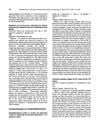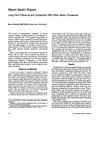 4 citations,
March 2021 in “Case Reports”
4 citations,
March 2021 in “Case Reports” A woman's excessive hair growth and masculine features were due to a rare benign ovarian tumor and endometrial cancer, which improved after surgery.
 November 2022 in “Journal of the Endocrine Society”
November 2022 in “Journal of the Endocrine Society” A woman's masculine features were caused by a rare ovarian tumor that produced male hormones.
 June 2003 in “Obstetrical & Gynecological Survey”
June 2003 in “Obstetrical & Gynecological Survey” After chemotherapy for a gestational trophoblastic tumor, normal pregnancy rates are possible, but there's a slightly higher risk of the tumor reoccurring in future pregnancies.
[object Object]  13 citations,
August 2020 in “Mayo Clinic proceedings”
13 citations,
August 2020 in “Mayo Clinic proceedings” Women with lichen planopilaris often have thyroid disease, depression, anxiety, and may respond to treatment with slowed disease progression.
5 citations,
October 2003 in “Archives of Dermatology” The elderly woman experienced hair loss and scalp itching, especially at the front hairline, and lost her eyebrows.
 3 citations,
May 2011 in “Journal of Obstetrics and Gynaecology”
3 citations,
May 2011 in “Journal of Obstetrics and Gynaecology” A woman's pelvic pain and bleeding led to finding and successfully treating a rare benign tumor in her reproductive system.
 1 citations,
December 1998 in “PubMed”
1 citations,
December 1998 in “PubMed” Surgery on a 68-year-old woman with an ovarian tumor led to reduced hirsutism and normal testosterone levels.
 December 2021 in “Aegean journal of obstetrics and gynecology”
December 2021 in “Aegean journal of obstetrics and gynecology” A woman's male-like physical changes were caused by two rare ovarian conditions.
July 2021 in “Journal of medical pharmaceutical and allied sciences” Amenorrhea, or missing periods, is caused by various factors and is treated based on the specific cause.
 April 2020 in “Journal of the Endocrine Society”
April 2020 in “Journal of the Endocrine Society” An ovarian tumor caused a woman's male-like symptoms, which improved after surgery.
 5 citations,
March 2014 in “Journal of The American Academy of Dermatology”
5 citations,
March 2014 in “Journal of The American Academy of Dermatology” The study suggests hormonal factors may play a role in Frontal Fibrosing Alopecia and that treatments like oral antiandrogens and steroids could be beneficial.
 March 2014 in “Journal of The American Academy of Dermatology”
March 2014 in “Journal of The American Academy of Dermatology” Mycophenolic acid may help hair growth, a combination treatment improves hair thickness in male hair loss, and early treatment of frontal fibrosing alopecia is important.
 5 citations,
November 2001 in “PubMed”
5 citations,
November 2001 in “PubMed” An 80-year-old woman's severe hair loss was caused by a hormone-secreting ovarian tumor.
 24 citations,
February 2007 in “International Journal of Dermatology”
24 citations,
February 2007 in “International Journal of Dermatology” A woman with cervical cancer had rare scalp metastasis causing a unique type of hair loss.
 9 citations,
July 2011 in “The Journal of Sexual Medicine”
9 citations,
July 2011 in “The Journal of Sexual Medicine” Hair loss drugs like finasteride may cause lasting sexual and mood side effects, and more research is needed to understand these risks.
 5 citations,
January 2006 in “Journal of obstetrics and gynaecology”
5 citations,
January 2006 in “Journal of obstetrics and gynaecology” Metformin can cause hair loss in some women with PCOS.
 1 citations,
January 2020 in “Skin appendage disorders”
1 citations,
January 2020 in “Skin appendage disorders” Finasteride may help treat frontal fibrosing alopecia, but more research is needed.
 October 2024 in “Journal of the Endocrine Society”
October 2024 in “Journal of the Endocrine Society” Leydig cell tumors can cause high testosterone and symptoms like hair loss in postmenopausal women, but surgery can improve these symptoms.
 January 2017 in “Springer eBooks”
January 2017 in “Springer eBooks” Eating a balanced diet with specific nutrients can help manage menopause symptoms and prevent related health issues.
 June 2003 in “Obstetrical & Gynecological Survey”
June 2003 in “Obstetrical & Gynecological Survey” Postmenopausal ovary stromal cells have a unique makeup and limited steroid production, suggesting androgens come from the adrenal gland.
 June 1995 in “International Journal of Gynecology & Obstetrics”
June 1995 in “International Journal of Gynecology & Obstetrics” Women with hair loss have higher androgen levels, while men with early balding have altered androgen ratios.
 June 1995 in “International Journal of Gynecology & Obstetrics”
June 1995 in “International Journal of Gynecology & Obstetrics” The new method showed that endometriotic tissue has lower estrogen receptor levels but similar progesterone levels compared to normal endometrium, with both following a similar cycle.
 339 citations,
February 2014 in “Journal of The American Academy of Dermatology”
339 citations,
February 2014 in “Journal of The American Academy of Dermatology” Most patients with frontal fibrosing alopecia are postmenopausal women, and treatments like finasteride and dutasteride can improve or stabilize the condition.
 68 citations,
September 2003 in “British Journal of Dermatology”
68 citations,
September 2003 in “British Journal of Dermatology” Shrinking skin cancer increases the chance of cancer in nearby lymph nodes.
 57 citations,
January 2003 in “Clinical and experimental dermatology”
57 citations,
January 2003 in “Clinical and experimental dermatology” Postmenopausal frontal fibrosing alopecia is a type of hair loss in postmenopausal women that may stop on its own but has no effective treatment.
 32 citations,
July 2017 in “Clinical and Experimental Dermatology”
32 citations,
July 2017 in “Clinical and Experimental Dermatology” Finasteride effectively treats hair loss in transgender men with few side effects.
[object Object]  26 citations,
December 2016 in “Psychiatric Clinics of North America”
26 citations,
December 2016 in “Psychiatric Clinics of North America” Testosterone therapy and surgeries like mastectomy improve transgender men's lives and mental health with low risks and high satisfaction.
 21 citations,
October 2017 in “Journal of the European Academy of Dermatology and Venereology”
21 citations,
October 2017 in “Journal of the European Academy of Dermatology and Venereology” Various potential triggers may be causing the rise in frontal fibrosing alopecia, and avoiding these could help stop the disease's increase.
 19 citations,
February 2012 in “International Journal of Urology”
19 citations,
February 2012 in “International Journal of Urology” In Japan, sex reassignment surgery for gender identity disorder faces challenges and needs better medical support and education.
 17 citations,
May 1983 in “The American Journal of Surgery”
17 citations,
May 1983 in “The American Journal of Surgery” The Mason gastric bypass is a better surgery for weight loss with fewer complications compared to other methods.




























